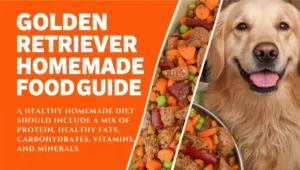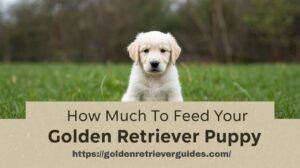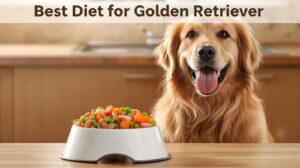Best Dog Food for Golden Retrievers: Complete Nutrition Guide 2025

Golden Retrievers are beloved family companions known for their friendly temperament and beautiful golden coats. Choosing the best dog food for golden retrievers is crucial for maintaining their health, energy levels, and that signature lustrous coat. This comprehensive guide explores top food recommendations, nutritional requirements, and feeding strategies specifically tailored for golden retrievers.
Table of Contents
Understanding Golden Retriever Nutritional Needs
Golden retrievers are large, active dogs with specific dietary requirements that differ from other breeds. When choosing the best dog food for golden retrievers, look for options high in protein to support muscle health and omega fatty acids for their luscious coats. These magnificent dogs typically weigh between 55-75 pounds and require a balanced diet to support their active lifestyle.
The best dog food for golden retrievers should contain high-quality protein sources, healthy fats, and essential nutrients. Golden Retrievers need a balanced diet to maintain their health, support their active lifestyle, and manage breed-specific issues like joint problems and allergies. This breed is particularly prone to certain health conditions that can be managed through proper nutrition.
Key Nutritional Components
The optimal diet for golden retrievers includes several essential elements. Protein should be the primary ingredient, typically comprising 20-25% of the food content for adult dogs. High-quality animal proteins like chicken, fish, or lamb provide the amino acids necessary for muscle maintenance and development.
Omega fatty acids play a crucial role in maintaining the golden retriever’s beautiful coat. EPA and DHA fatty acids support skin health and create that characteristic golden shine. The best dog food for golden retrievers incorporates these nutrients naturally through fish oils or flaxseed.
Top-Rated Dog Food Brands for Golden Retrievers
Premium Commercial Options
Several reputable brands have developed formulations specifically for large breed dogs like golden retrievers. Royal Canin Golden Retriever Adult dry dog food is designed to meet the nutritional needs of purebred Golden Retrievers 15 months and older, offering breed-specific nutrition that addresses common health concerns.
Other highly-rated options include brands that focus on natural, whole-food ingredients. Healthy, all-natural Lucy Pet Formulas For Life™ Dog food offers the perfect source of nutrition for golden retriever’s unique needs. These premium formulations often include probiotics, antioxidants, and joint-supporting ingredients.
Grain-Free vs. Grain-Inclusive Options
The debate between grain-free and grain-inclusive diets continues among pet owners. The best dog food for golden retrievers depends on individual sensitivities and preferences. Some golden retrievers thrive on grain-free formulations, while others benefit from wholesome grains like brown rice or oats that provide sustained energy.
When selecting between these options, consider your dog’s activity level, age, and any known allergies. Active golden retrievers may require higher calorie content regardless of grain inclusion, while senior dogs might benefit from easily digestible carbohydrates.
Life Stage Feeding Guidelines
Puppy Nutrition Requirements
Golden retriever puppies have unique nutritional needs during their rapid growth phase. Puppies from this breed shouldn’t be given food that has high calories so that they don’t grow too quickly. The best dog food for golden retriever puppies should support steady, controlled growth to prevent joint problems later in life.
Puppy formulations typically contain higher protein and fat content to fuel development. Feed puppies 3-4 times daily with portions adjusted based on age and weight. Monitor growth rates carefully, as golden retrievers are prone to hip dysplasia and other joint issues that can be exacerbated by rapid growth.
Adult Dog Feeding
Adult golden retrievers (15 months and older) benefit from twice-daily feeding schedules. The best dog food for adult golden retrievers should maintain optimal body condition while supporting their active lifestyle. Portion control becomes increasingly important as these dogs have hearty appetites and can easily become overweight.
Golden Retrievers are sensitive to weight gain, which can lead to unwanted health issues. Regular monitoring of body condition and adjusting portions accordingly helps maintain ideal weight throughout their adult years.
Senior Dog Considerations
Senior golden retrievers (7+ years) require adjustments to their diet to address age-related changes. The best dog food for senior golden retrievers typically contains fewer calories but maintains protein levels to preserve muscle mass. Joint-supporting ingredients like glucosamine and chondroitin become particularly beneficial.
Health Benefits and Special Considerations
Coat Health and Shine
The golden retriever’s coat is one of their most distinctive features, and nutrition plays a vital role in maintaining its health and appearance. The best dog food for golden retrievers includes omega-3 and omega-6 fatty acids that support skin health and promote coat shine.
Regular brushing combined with proper nutrition creates the foundation for a healthy, beautiful coat. Dogs fed high-quality diets typically show improved coat texture and reduced shedding within 6-8 weeks of dietary changes.
Joint Health Support
Golden retrievers are predisposed to hip dysplasia and elbow dysplasia, making joint health a priority in food selection. The best dog food for golden retrievers often includes glucosamine, chondroitin, and omega fatty acids that support joint function and mobility.
Maintaining proper weight through portion control and choosing foods with joint-supporting ingredients can significantly impact long-term mobility and comfort. Prevention through nutrition is far more effective than treatment after problems develop.
Common Feeding Mistakes to Avoid
Many well-intentioned owners make feeding mistakes that can impact their golden retriever’s health. Overfeeding is perhaps the most common issue, as golden retrievers rarely refuse food and can quickly become overweight.
Free-feeding, where food is left out all day, often leads to overeating and makes it difficult to monitor intake. The best approach for golden retrievers involves scheduled meal times with measured portions.
Table scraps and excessive treats can unbalance carefully formulated diets. While occasional healthy treats are acceptable, they should comprise no more than 10% of total daily calories.
Expert Recommendations and Feeding Tips
Veterinarians consistently recommend high-quality commercial diets for golden retrievers. Dr. Sarah Johnson, a veterinary nutritionist, notes: “The best dog food for golden retrievers provides balanced nutrition without requiring supplementation in healthy dogs.”
Transitioning to new foods should be done gradually over 7-10 days to prevent digestive upset. Mix increasing amounts of new food with decreasing amounts of current food until the transition is complete.
For more comprehensive information about golden retriever care and feeding, visit our golden retriever guides section for additional resources.
Cost Considerations and Value
The cost of premium dog food can be significant, but investing in high-quality nutrition often reduces long-term veterinary expenses. Calculate feeding costs based on daily serving sizes rather than bag prices, as premium foods typically require smaller portions due to higher nutrient density.
When evaluating options, consider the cost per feeding rather than cost per bag. The best dog food for golden retrievers provides excellent value through improved health outcomes and potentially longer lifespan.
For additional pet nutrition information and feeding guidelines, consult resources from the AAFCO (Association of American Feed Control Officials) for comprehensive feeding standards.
Conclusion
Selecting the best dog food for golden retrievers requires careful consideration of nutritional needs, life stage, and individual health factors. High-quality protein, omega fatty acids, and balanced nutrition form the foundation of optimal health for these beloved companions. Whether choosing premium commercial brands or specialized formulations, the key lies in consistency, appropriate portions, and monitoring your dog’s response to their diet.
Remember that the best dog food for golden retrievers supports not just basic nutrition but also addresses breed-specific concerns like coat health and joint support. Regular veterinary consultations ensure your feeding program meets your individual dog’s needs as they age and their requirements change.
The investment in quality nutrition pays dividends in your golden retriever’s health, longevity, and quality of life. With so many excellent options available, finding the perfect diet for your golden companion becomes a matter of understanding their unique needs and choosing accordingly. Have you considered how your golden retriever’s current diet might be affecting their long-term health and happiness?



